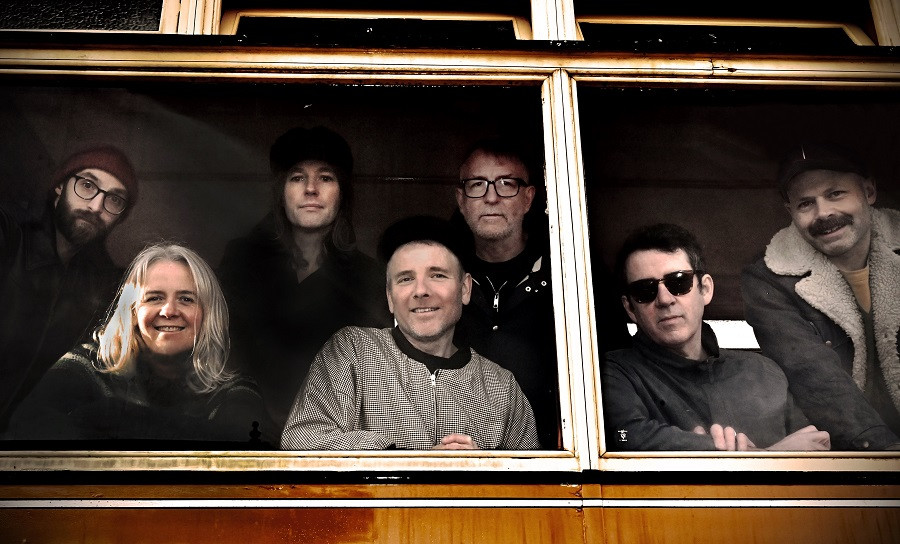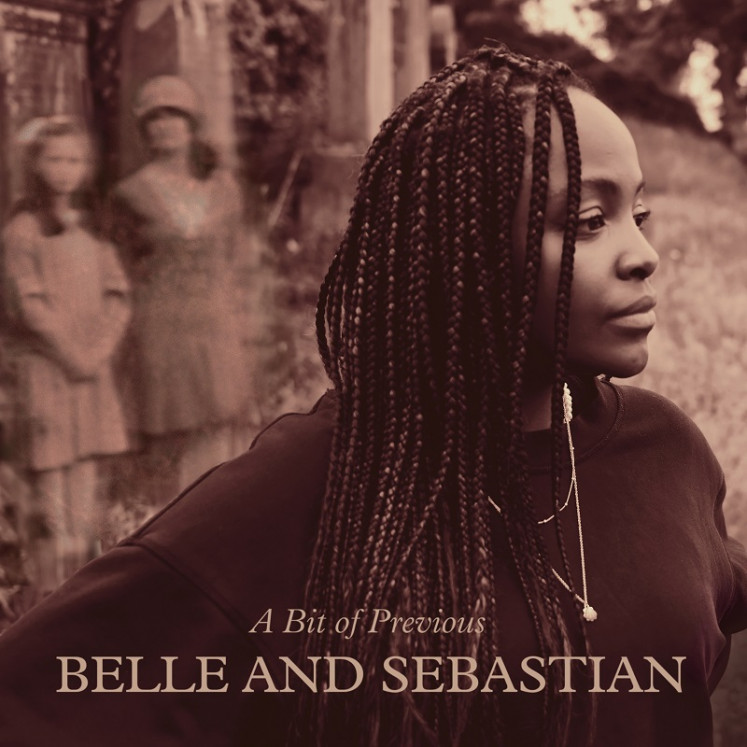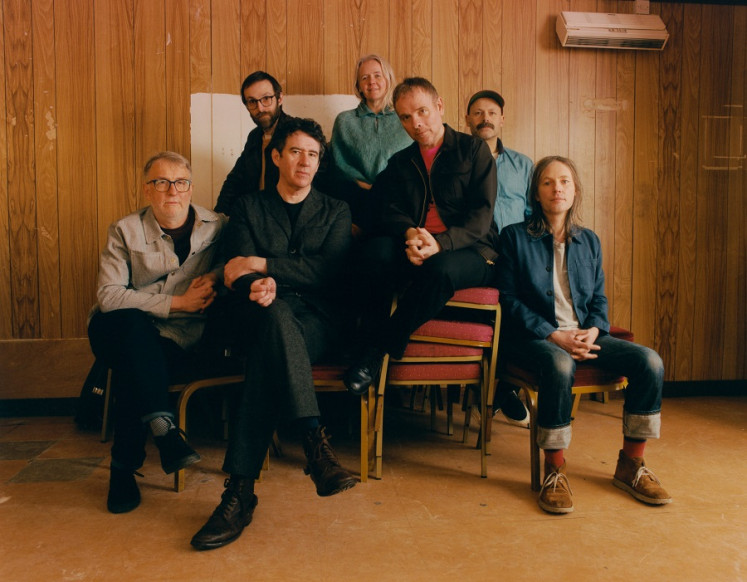Popular Reads
Top Results
Can't find what you're looking for?
View all search resultsPopular Reads
Top Results
Can't find what you're looking for?
View all search results[Exclusive] Belle & Sebastian talks new album, Buddhism and staying optimistic
The legendary Scottish indie pop group is releasing its first full-length studio album in almost a decade. Frontman Stuart Murdoch and covocalist Sarah Martin share Belle and Sebastian's journey to A Bit of Previous with The Jakarta Post while reflecting on growing older and learning to reconnect post-lockdown.
Change text size
Gift Premium Articles
to Anyone
T
he legendary Scottish indie pop group is releasing its first full-length studio album in almost a decade. Frontman Stuart Murdoch and covocalist Sarah Martin share Belle and Sebastian's journey to A Bit of Previous with The Jakarta Post while reflecting on growing older and learning to reconnect post-lockdown.
The press release on Belle and Sebastian’s upcoming studio album, A Bit of Previous, contains an interesting line. Amid pithy observations about everyday life, the recording process and spirituality, the band tells listeners: “This is not a pandemic record.”
Perhaps, having mastered the art of singing beautifully about inertia, they’re no longer shocked by loneliness and the world falling apart.
Ever since it was formed in 1996, the Glasgow band has established itself as a bona fide indie pop legend. Its sophomore album, 1996’s If You’re Feeling Sinister, was dubbed one of the 100 best albums between 1985 and 2005 by SPIN magazine. With it came indie cred, a burgeoning place in pop culture – Barry, the music snob Jack Black portrayed in 2000’s High Fidelity famously dismissed the band as “old sad [expletive] music” – and increasing critical and commercial acclaim.
After embracing a more polished, grander sound at the turn of the millennium, albums like The Life Pursuit (2006) and Belle and Sebastian Write About Love (2010) have consistently climbed into the top 10 in the United Kingdom, powered by successful singles like “Funny Little Frog” and “I’m a Cuckoo”.
Not bad for a group of shy Scots used to singing delicately about life.
“If you said to me twenty years ago that we would show up in Indonesia and there would be a crowd to see us play, I wouldn’t believe you,” lead singer Stuart Murdoch admitted while beaming, referring to the band’s Jakarta concert in 2010.
“Our songs are about feelings. It’s an abstract form, so when you listen to the music it can mean anything to you. I think that’s partly why we do pretty well around the world.”
Of course, the pandemic put paid to any well-laid plans and the band’s well-trodden sense of optimism. A proposed recording session in Los Angeles was canceled after lockdown rules forced them to stay in the UK.
“Sarah was so mad we couldn’t go to America that she broke a television,” Murdoch joked, referring to multi-instrumentalist Sarah Martin. “But we couldn’t do anything for six months because of the lockdown.”
Stuck in Glasgow, their plans in tatters and their friends far away, the group decided to simply do what they do best: hunker down and make music.
Reincarnation: Artwork for their upcoming album, 'A Bit of Previous'. The title was inspired by the Buddhist idea of reincarnation (Courtesy of Belle & Sebastian) (Courtesy of Belle & Sebastian/Courtesy of Belle & Sebastian)Recording at home
Since there was no place to be but Glasgow, the band converted its rehearsal space into a COVID-safe studio and worked with a skeleton crew of core members and recording engineers and self-produced A Bit of Previous. The band members also made the fateful decision to ditch most of the songs they had written for the new album, essentially starting from scratch.
“By that point, my mood was different. I had left behind the songs we wrote for L.A. and I started to write new songs,” Murdoch recalled. “It’s not as if being in Glasgow means the songs necessarily become more Scottish, but we were able to do these songs and record them immediately.”
This paved the way for a series of unexpected milestones: the first full-length album of original material since 2015’s acclaimed Girls in Peacetime Want to Dance; the first time the band had recorded in their native city since 2000’s Fold Your Hands Child, You Walk Like a Peasant. And most importantly, it was the most hands-on project since the band’s early days.
“Things were definitely less condensed,” said multi-instrumentalist Martin Martin. “We had a lot of time in Glasgow.”
That unhurried pace also meant they were able to take in last-minute ideas and rushes of inspiration.
“Some songs were even written on the morning they were recorded. The song ‘Prophets on Hold’ was written while walking up to the studio. We would wake up with an idea, then go straight into the studio to put down the chords,” said Murdoch.
None of which could have happened in L.A. “We would have been thinking that everybody is already here and the studio is expensive,” Murdoch laughed. “But because we had that time, we were able to build the songs up.”
And then, there was the daily ritual. Done with a long day’s slog at the studio, the members received recordings of their new song through Dropbox, after which they each set off into the city. Martin said she loved to play the recording in her car while going about her daily life, while Murdoch would get on a train and go on “a sort of a pilgrimage” across Glasgow.
“Because of the way the trains go, I quite often end up in Yoker, a far-off suburb, then I can jump on the train home,” Murdoch reminisced. “I would be walking up one of the main streets in Glasgow with people around, getting out for exercises during lockdown, and you felt like you had an audience.”
He referred to this “ritual” in the album’s liner notes as holding up their songs to “silent judges”, changing elements in a song if he felt it collided with the sights and landscapes he was experiencing.
“It’s also about getting into your more normal non-studio headphones and being able to listen to the songs in an environment that’s more familiar and comfortable,” Martin added. “We’re seeing how the songs translate into real life.”
In doing so, Murdoch said, every song ended up sounding different from another. Tracks like “Working Boy in New York City” and “Prophets on Hold” stick out with their relentless optimism, laid-back, almost funky instrumentation and gorgeously soaring choruses. On songs like “Young and Stupid” and “Unnecessary Drama”, Belle and Sebastian almost seems to be channeling the ghosts of power pop and folk rock heroes of the past.
“The first records we made were quite gentle and nice,” Murdoch said. “But you go towards trying to make records you’d want to listen to yourself, which is slightly more energetic.”
Even so, the central tenets of a good Belle and Sebastian song persist: Murdoch’s fey, delicate voice, vocal harmonies and the presence of harmonica and subtle synths.
“We’re just feeling our way through things and letting the songs be itself,” Martin said. “Chris [Geddes] is always disappointed, though. He always goes, ‘Oh, I’d never want to play that,’” Martin said, referring to the band’s keyboardist.
“You know why?” Murdoch grinned. “Because it sounds like Belle and Sebastian. The trouble is, once you put the songs in the room and we get our mucky hands on it, it’ll still sound like us at the end of the day.”
“There’s not much worse than Belle and Sebastian in disguise, is there?” Martin said, laughing. “We’re not convincing masters of deception.”
Back in the game: After seven years, Scottish indie pop legends Belle & Sebastian are releasing their tenth full-length album of original material, titled 'A Bit of Previous'. (Courtesy of Belle & Sebastian/Hollie Fernando) (Courtesy of Belle & Sebastian/Hollie Fernando)To be with others
Glasgow might not have consciously influenced their sound, but the situation forced upon them certainly pushed them into a rethink, according to Murdoch. “Maybe thinking about the situation we’re in, thinking about the people that were far away and we missed during the lockdown, it caused us to meditate about different people and write different songs,” he reflected.
The lead single “Unnecessary Drama”, for example, is about Murdoch’s long-distance friend in Australia. Looking through their correspondence over the years, he was able to see how they had changed as people.
The passage of time is an overarching, if subtle, theme in the album. The band members are pushing 50 or over, raising families, and realizing life isn’t all it’s cracked up to be. A Bit of Previous is peppered with songs that stem from their personal reflections, from growing older and passing the baton to a new generation to reclaiming a love for life despite the terror of it all.
At the end of the day, this journey is presented with optimism. The album’s opener, “Young and Stupid”, starts with Murdoch resignedly singing, “I was yelling in my sleep,” moaning about the passage of time and physical frailty. But by the album’s closer, “Working Boy in New York City”, he is excitedly singing, “Everybody gets an even shot at making heaven/wide is the gate,” over sunny, almost Beach Boys-esque instrumentation.
Murdoch smiled in response to this apparent sea change: “It’s a nice thing you pointed out, that it starts quite dark but it ends up more optimistically, by looking outwards to other people.
“With social media and the lockdown, personally I feel people are more locked into themselves. That can be dangerous. Sometimes you realize that once you look outwards and think about other people, think about being charitable and doing things for other people, you think about yourself less. That’s a very healthy thing.”
Even the album’s title, A Bit of Previous, is a nod to this desire to find solace in one’s connection to others. Alluding to the Buddhist concept of reincarnation, Murdoch writes in the liner notes, “we have been reborn so many times and in so many guises that if we look around us, we are bound to see a person who has been our mother in a past life. [...] If we truly had that in our minds and in our hearts, we would drop the prejudice we had: our attitude to strangers and difficult people would alter emphatically”.
Faith has always been a big part of Belle and Sebastian’s oeuvre, but Murdoch’s fascination with Buddhism has gradually influenced the band’s lyrics. It is a love affair that began almost a decade ago, when Murdoch began raising a family with his partner. One of his two young sons is autistic, and coupled with his long-term struggle with chronic fatigue syndrome, Murdoch admits the strain pushed him close to breaking point.
“It was exhausting, and I’m not even the mom. She has the hardest job,” Murdoch said, chuckling. “Anybody can fall into a difficult period, but mine’s probably lasted a bit longer than most. It’s been thirty years.”
He visited a local Buddhist center, seeking to restart his old habit of meditating to regain a sense of control. Instead, he found a loving community and a way of looking at life that resonated with him. “It was the answer for me at that moment. It taught me the things that I needed,” he said. “It was a protection.”
Murdoch credits Buddhism with bringing him peace of mind when he was close to being overwhelmed by everything. It also afforded him a healthy way of seeing the world, despite the horrors of war, the pandemic and conflict.
“I think one of the beautiful parts of Buddhism is that they accept different ideas. Every person was born into different situations, so we have to accept that people believe in different things,” he said.
“Twenty years ago, this conversation wouldn’t be happening. We know about each other’s culture now. We can no longer deny that people come from different backgrounds. We have to learn that by being accepting.”
After their enforced distance during lockdown, this idea of slowly reconnecting with people is both exciting and scary. The band is entertaining the idea of touring worldwide, but admits that even traveling to Paris the week before this interview was shocking.
“I guess things are starting to happen again, aren’t they?” Martin said. “It’s a violent birth getting to know each other so intimately.
“This has never happened before on the planet. But in time, hopefully, people will get used to the idea.”
A Bit of Previous is due out on May 6, 2022 and available to preorder on the Belle and Sebastian official website.












